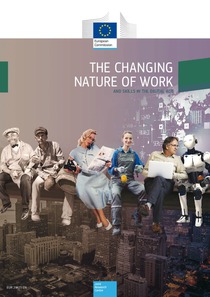The changing nature of work and skills in the digital age

Joint Research Centre, Ispra ; European Commission
Publications Office of the European Union - Luxembourg
2019
101 p.
work ; technological change ; labour market ; digitalisation ; skill requirement ; new work practices ; digital economy ; employment ; regional level
Labour economics
https://doi.org/10.2760/679150
English
Bibliogr.;Statistics
"This report aims to shed light on some of the key drivers which are worth taking into account when assessing the effect of new technologies on the future of work and skills. It combines a synthesis of the most recent and robust scientific evidence available with original JRC research on issues which have been often overlooked by existing studies. In particular, the report provides new insights on the interplay between automation and work organisation, the extent and nature of platform work, and the patterns of occupational changes across EU regions. The first chapter discusses the impact of technology on employment. It overviews the most recent estimates on technology-induced job creation and destruction, and provides new insights on the role of workplace organisation in shaping the effect of new technologies on labour markets. The second chapter discusses how skills needs are shifting towards digital and non-cognitive skills, showing evidence of an increasing shortage of these skills in the EU, which education systems are not fully tackling yet. The third chapter reviews the opportunities and challenges related to the recent upwards trend in new forms of employment in the EU, focusing on the results of the second wave of the COLLEEM survey on platform work in the EU. The final chapter presents results from a new JRC-Eurofound study on the patterns of occupational change in EU regions in the last 15 years which shows that low-wage jobs have increasingly concentrated in peripheral regions while higher-wage jobs are becoming more and more concentrated in capital regions, leading to increasing territorial disparities, both across and within EU Member States."
Digital
ISBN (PDF) : 978-92-76-09206-3
The ETUI is co-funded by the European Union. Views and opinions expressed are however those of the author(s) only and do not necessarily reflect those of the European Union or the ETUI.